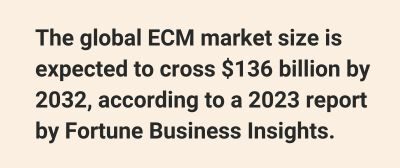The digital landscape is changing at a rapid pace. As technology evolved with the advent of Generative AI and Agentic AI, the customer expectations soared, enterprises faced a myriad of challenges in managing their digital content effectively. Gartner said that the Enterprise Content Management (ECM) market has been constantly changing due to a shift in business requirements for digital content and modern technologies.

Traditional ECM systems, once the cornerstone of content management, are now struggling to keep up with the dynamic needs of modern businesses. Legacy platforms often hinder innovation, increase complexity, impede collaboration, and limit scalability, prompting enterprises to seek more agile and future-proof solutions.
The Challenge of Traditional ECM Platforms
Traditional ECM platforms pose significant business hiccups for enterprises. Deloitte’s 2024 MarginPLUS study stated that challenges, such as legacy tech infrastructure and rigid operating structures, resulted in higher failure rates, limiting the growth of organizations.
- Scalability Limitations: Legacy systems aren’t designed to handle the exponential growth of digital content, leading to performance bottlenecks and storage constraints as data volumes continue to soar
- Lack of Flexibility: Monolithic architectures make it difficult to adapt and evolve with changing business requirements and emerging technologies, limited integrations, stifling agility, and hindering innovation
- Compliance and Governance Challenges: With the increasing emphasis on data privacy and regulatory compliance, traditional ECM systems struggle to meet the stringent requirements of modern governance frameworks, exposing organizations to legal and reputational risks
- Data Migration Complexity: Migrating data from legacy ECM systems to modern platforms can be a daunting and complex process, involving data mapping, cleansing, and validation, as well as potential disruptions to business operations
- Complexity and High On-prem Costs: Managing and maintaining traditional solutions can be complex and resource-intensive, with organizations often grappling with high operational costs and low returns on investment
- Security Concerns: Legacy systems often lack robust security features, leaving sensitive data vulnerable to breaches and cyberattacks. Inadequate access controls and encryption mechanisms further exacerbate security risks, putting confidential information at risk.
The Forrester Wave™: Content Platforms, Q1 2025
Organizations looking for an advanced content platform capable of scaling for heavy workloads and that need deployment flexibility and advanced automation and AI capabilities should consider Newgen.
Why Modern Enterprises Need Content Services, Not Just ECM
The market for modern content services platforms is witnessing significant growth, driven by several key trends:
- The increasing adoption of cloud-native technologies and microservices architectures, enabling organizations to achieve greater flexibility, scalability, and agility in their content management strategies
- The rising demand for personalized and omnichannel experiences, and the need for decoupling the content delivery from presentation layers to enable seamless content distribution across multiple channels and devices
- The growing importance of data security and compliance, driving organizations to invest in content services platforms that offer robust encryption, access controls, and regulatory compliance features to safeguard sensitive information
Empowering Enterprises with Intelligent Content Services
Newgen’s AI-first content services platform is designed to empower modern enterprises with smart content strategies. Built on NewgenONE, AI-first low-code platform, Newgen’s robust content services platform offers a comprehensive suite of features and functionalities tailored to the needs of today’s businesses.
Capabilities of Newgen’s AI-first Content Services Platform
- Comprehensive and Microservices Architecture: Newgen’s intelligent content services platform leverages modular services and modern architecture to enable building and changing applications faster and simpler
- Seamless Integration and Customization: The platform’s integration toolkit and API capabilities facilitate seamless integration with third-party systems and enable customizations to meet unique business requirements
- Infinitely Scalable: Built on a cloud-native architecture, the content services platform ensures high availability, fault tolerance, and scalability to support the growing needs of modern enterprises
- Free Trial and SaaS Model: The content services platform offers a free 14-day trial for organizations to experience its capabilities firsthand before making a commitment. Additionally, it is available as a Software-as-a-Service (SaaS) offering, providing organizations with a flexible and cost-effective deployment option
- Smooth Migration: Newgen’s content services platform facilitates effortless partial and full migration of content from the current ECM system to its contemporary headless solution using its advanced migration toolkit. Leveraging industry-standard methods, we ensure a seamless migration journey with zero data loss
- Security and Compliance: The content services platform ensures robust security and governance by encrypting data, enforcing access controls, and providing audit trails. With features like SSL/HTTPS transmission and OAuth 2.0 authentication, it offers comprehensive protection for enterprise content.
Frequently Asked Questions
What is the difference between Enterprise Content Management (ECM) and Content Services?
Enterprise Content Management (ECM) refers to a centralized platforms designed to capture, manage, and store content. Content Services, on the other hand, are modern, cloud-native platforms that go beyond ECM, offering flexibility, microservices-based architecture, AI-driven automation, and seamless integration across business applications.
Why are enterprises moving from ECM to Content Services Platforms (CSP)?
Traditional ECM systems often struggle with scalability, integration, and agility. Enterprises are shifting to Content Services Platforms (CSP) because they offer cloud scalability, contextual insights, advanced security, and AI-powered automation, making them better suited for today’s dynamic digital landscape.
How do Content Services Platforms (CSP) improve compliance and security?
CSPs come with built-in governance, encryption, audit trails, and access controls. Unlike older ECM systems, they ensure regulatory compliance across industries while safeguarding sensitive data in hybrid or cloud environments.
How should enterprises plan their ECM to Content Services migration?
The best approach is to use migration toolkits that minimize risks and downtime. Start with critical repositories, move gradually, and adopt hybrid deployment if needed. A well-planned migration ensures continuity while enabling access to modern features like AI, cloud, and contextual services.
You might be interested in

22 Jan, 2026
Why storing everything is not the optimal email archiving strategy for 2026



